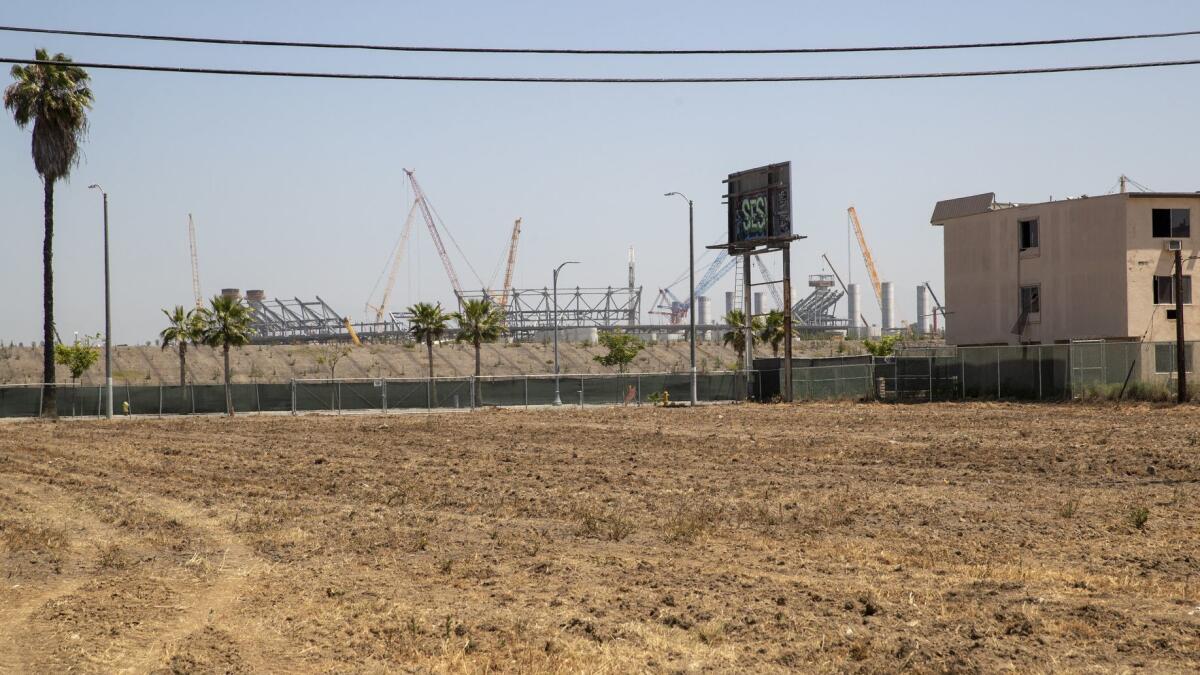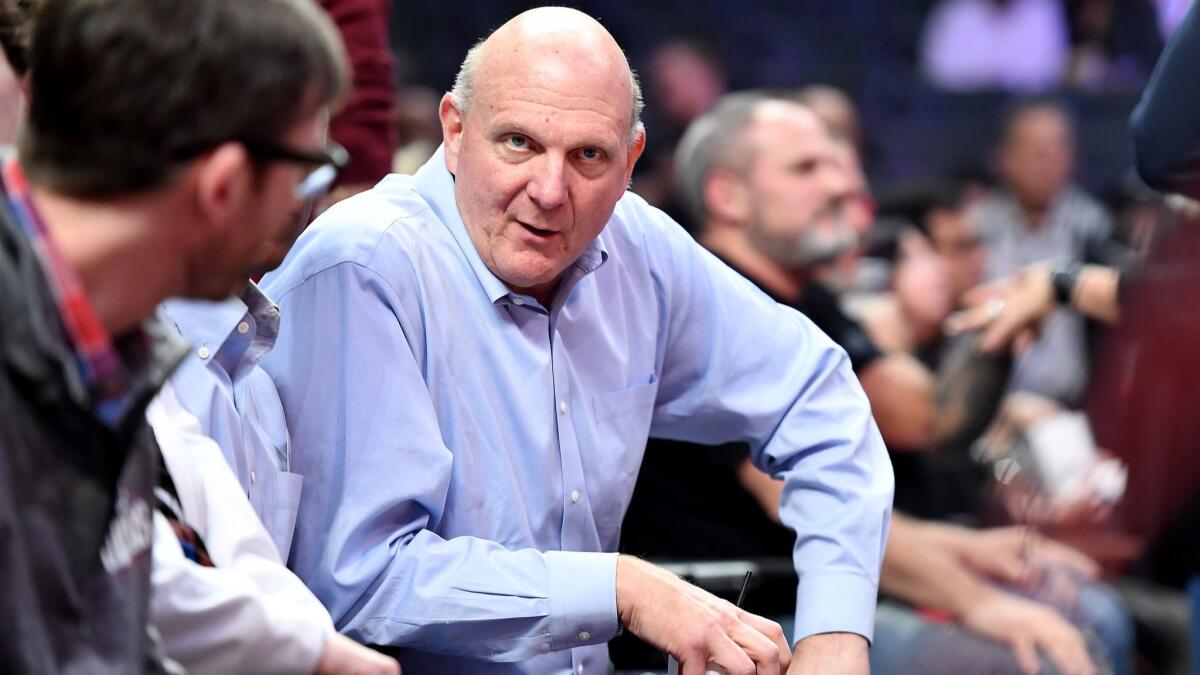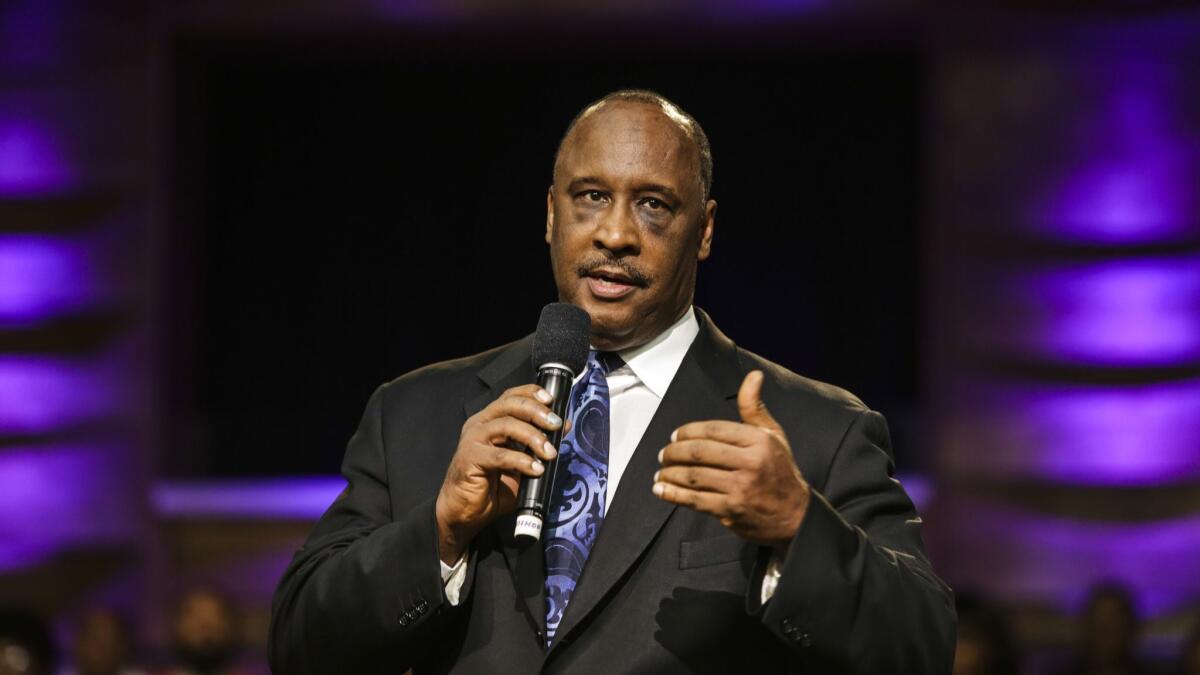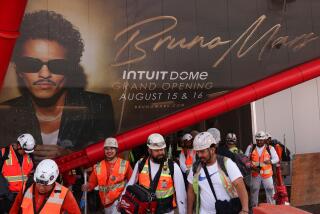Fight intensifies over proposed arena for Clippers in Inglewood

The land along West Century Boulevard in Inglewood where the Clippers plan to build an arena is easy to miss, a bleak stretch of fenced-off vacant lots near a fast-food restaurant selling fried chicken and motel offering simple rooms for $80 a night.
Billionaire Clippers owner Steve Ballmer wants to transform the four blocks into a privately funded home for his franchise, a state-of-the-art competition venue, team offices, practice facility, sports medicine clinic and more.
But almost a year and a half after the Clippers and Inglewood signed an exclusive negotiating agreement to explore the project, the land remains at the center of a legal brawl pitting Madison Square Garden Co., which owns the nearby Forum, against the franchise Ballmer bought for $2 billion and the city he would like his team to call home.
Before the first renderings of the arena have been released — hopeful illustrations are a rite of passage for even the most far-fetched stadium or arena proposals around Los Angeles — the sides have marshaled a small army of attorneys, lobbyists and public relations professionals as the 18-month review of the project’s environmental impact moves forward.
They have lobbed accusations and subpoenas at each other. They poured cash into last month’s mayoral election — MSG donated more than $700,000 to oppose the incumbent, James T. Butts Jr., a staunch arena supporter, while Ballmer backed the mayor with about $440,000, helping Butts coast to a third term with 63% of the vote. They have filed thousands of pages of documents, many heavily redacted or sealed, in six lawsuits that involve at least eight law firms plus city and county attorneys.
Spokesmen for the project and MSG declined to comment on the litigation. An NBA spokesman didn’t respond to a question about whether the league plans to mediate a solution.

The fight escalated Tuesday when Murphy’s Bowl LLC, the Clippers-controlled company behind the arena, countersued MSG in L.A. County Superior Court.
“The proposed Los Angeles Clippers Arena … is the latest in this series of projects that will reshape Inglewood and benefit its residents for decades,” the countersuit said. “MSG Forum LLC … fearing the competition it would face from a new arena in Inglewood, seeks to stop the Clippers Arena in its tracks.”
The filing accused MSG of using the lawsuits to force the Clippers to “abandon their plan to move to Inglewood.” Murphy’s Bowl wants the court to declare its 36-month exclusive negotiating agreement with Inglewood to be valid and enforceable.
Last month, Inglewood attorneys from Miller Barondess filed a motion accusing Latham & Watkins, which represents MSG, of orchestrating anti-arena lawsuits by two community groups. The attorneys want a court order compelling Latham & Watkins to turn over documents about Uplift Inglewood and Inglewood Residents Against Takings and Evictions, known as IRATE, after the firm balked at producing the material.
“We are absolutely not funded by MSG and have been around since 2015 advocating for housing justice policies in the city prior to any dispute between the city and MSG,” D’Artagnan Scorza, an Inglewood resident representing Uplift Inglewood, told The Times.
Uplift Inglewood believes Inglewood violated the state’s Surplus Land Act by offering land for an arena instead of affordable housing; the city disputes the claim.
The lead attorney for IRATE, who filed two lawsuits alleging the project violates California’s Environmental Quality Act, declined to comment.
“The truth is,” the Inglewood attorneys wrote in the filing last month seeking the court order, “MSG does not want competition with The Forum, so it filed this suit ... to harass Defendants and block the Clippers arena by any means necessary.”
The document accused MSG of orchestrating a “campaign to undermine the Mayor” and a “scorched earth attack” that is “aimed at destroying the Mayor’s reputation.”
The confrontational tone is echoed in filings by MSG in the company’s three arena-related lawsuits. They accuse Butts of masterminding a “fraudulent scheme” to trick MSG into terminating its lease last year to use 15 acres of city-owned land for overflow parking by saying the land was needed for a technology park. That land is among the 23 acres under consideration for the project. Butts, who declined to comment because of the ongoing litigation, has denied the accusation in court filings.
In September, a judge ruled that the mayor could be held personally liable for damages in the fraud lawsuit.

MSG, which invested $100 million to overhaul the Forum in 2013, also claimed that Inglewood breached its development agreement by allowing a competing arena less than two miles from its venue and violated California’s Public Records Act by only producing a handful of documents in response to a request for communications about the arena.
Inglewood attorneys have deposed several executives with connections to MSG, including business mogul Irving Azoff, who works closely with the company, and communications consultant Steve Sugerman.
The attorneys have also sought to depose James Dolan, the New York Knicks owner and chief executive of MSG, saying in a court filing Dolan received at least 80 emails about the arena dispute. It’s unclear whether Dolan has been questioned.
MSG attorneys have deposed members of Inglewood’s city council, city manager Artie Fields, mayoral assistant Melanie McDade-Dickens and Butts.
An exchange in September filed in court last month is typical of the conflict that seems to grow more bitter each day. After Latham & Watkins attorneys deposed Butts in August — only brief excerpts have been made public with the bulk designated “highly confidential” — one of them sent an acid-tongued letter to the outside counsel for Inglewood.
The letter accused Miller Barondess attorney Skip Miller of “disruptive, inappropriate, and obstreperous conduct” during the deposition that included questions about the mayor’s personal life. Miller instructed Butts not to answer and described questions as “snotty” and “low end.”
Miller responded in a letter: “Your questions were harassing and insulting, part of your ongoing smear campaign for the Mayor. It is below a firm like yours to even ask such questions.”
The attorney dismissed another contentious issue left over from the deposition.
“Who is paying the Mayor’s legal fees and whether he has been indemnified for MSG Forum’s claims is not relevant to this case,” Miller wrote.
During Butts’ deposition, the attorney described the information as “private and confidential.”
Inglewood denied a public records request by the L.A. Times for records of payments to the two law firms representing the city and its officials in the arena lawsuits.
MSG attorneys want a court order compelling further answers from Butts and McDade-Dickens.
None of this is expected to be resolved soon. The Clippers have a lease to play at Staples Center along with the Lakers and Kings — sharing the arena is one of the reasons Ballmer wants to build his own — through the 2024 season. A spokesman for AEG, which owns Staples Center, said the company and Clippers haven’t engaged in recent talks about extending the lease. He declined to specify the time frame.
Most of the 23 acres near West Century Boulevard remain empty. Across the busy street, giant cranes peek over a dirt berm. They’re assembling the multibillion-dollar stadium Rams owner Stan Kroenke is building for his franchise and the Chargers.
The 298-acre development encountered little resistance after it became public three and a half years ago.
Twitter: @nathanfenno
More to Read
Go beyond the scoreboard
Get the latest on L.A.'s teams in the daily Sports Report newsletter.
You may occasionally receive promotional content from the Los Angeles Times.











